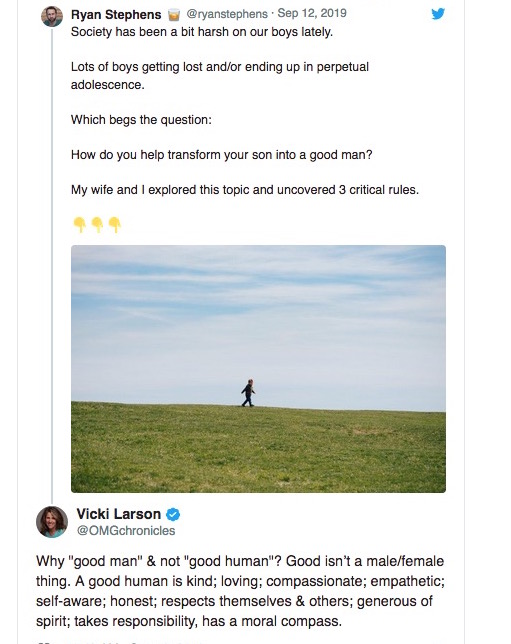Recently, Ryan Stephens — a self-proclaimed “father, voracious reader, strategist, optimistic contrarian” — asked on Twitter, “How do you help transform your son into a good man?” and then detailed bullet points he and his wife, Alaina, follow based on a post on their Dialed in Men blog.

So, I questioned whether being a good man would be any different than being a good woman or a good gender non-binary person. Why not say, a “good human”?

This did not go over well!
It promptly got be blocked by Stephens. Then tweets from his supporters (and hey, I was one) dissed me:
Don’t let yourselves be set up, fellas. She already knows the answer to these questions but she’s waiting for you to slip up so she can play the “gotcha” game.
— Ryan Michler (@ryanmichler) September 15, 2019
Well, I actually do not know the answers, which is why I was asking for clarification.
Which may be weird because I’m a mom of two boys, now young men, and you might think I would know. But I don’t; I did not raise them to be good men — just good people.
So it really made me curious about how we would define being a good man any different than being a good woman.
A conversation with Good Men Project founder
Before I get into what I think people like Stephens and his followers are talking about (and if they were willing to engage perhaps I, and you, would know what they’re talking about instead of having to read between the lines), I have to say that I was reminded of the “conversation” I had with the then-head of the Good Men Project, Tom Matlack, a few years ago.
I wrote a very tongue-in-check column for HuffPost that went viral (yay! fame! Uh, no!) and then led to a “conversation” with Matlack. Well, it was hardly a conversation — he was the only one who posed questions (I could only answer); he wouldn’t allow me to question his personal infidelity story because it was “too personal,” although he’d talked and written publicly about it and yet somehow felt quite free to ask me personal questions about my then-minor children.
But the biggest issue I had was with this question he asked me:
Tom: In the course of my work with “The Good Men Project,” I’ve spoken to thousands of men about what it means to be good — from inmates to celebrities — and one of the things I have come to is that goodness is a self-defined concept. For one man it might be taking care of his autistic child and for another it’s risking his life to take pictures of the truth of the war in Iraq. How do you define “good” as it relates to manhood?
I felt like he might be baiting me. Wanting me to define a “good man” as some sort of a cliche — provider, strong, protector.
So, I answered him questioning the concept of good, and whether it’s gendered:
Not to diss the name of your project, which as the mom of two young men and a woman who loves men I’m a fan of, but good is a meaningless word. Mildred Baena called Arnold Schwarzenegger a good man. Good to her, perhaps, but not to his family. And, you aren’t good because you’re taking care of your autistic child; that’s what you signed up for when you became a parent.
Good isn’t a male or female thing. So I’d rather define what it is to be human — kind; loving; compassionate; empathetic; self-aware; honest; respects him/herself and others; generous of spirit; realizes he/she is part of a much bigger picture; takes responsibility for his/her actions, and has a moral compass. That’s so incredibly sexy it’s beyond “good.” Bonus points if it comes with a great face and bod.
Can gender non-binary people be ‘good’?
So, you bet I wondered what Stephens meant when he said he was trying to raise his son to be a “good man.” What if his child declared that he was non-binary and identified as they/them — would his child know how to be a good non-binary person if they were raised to be a “good man”?
As Liz Plank, whose new book, For the Love of Men, addresses how our toxic view of masculinity is hurting men, says:
there’s one human species and we’re more identical than we are different. We’re forcing people into boxes that don’t serve them or society.
Some of Stephens’ Twitter defenders insist boys and girls are different and we can’t deny that:
“Good man” and “good woman” are infinitely useful paradigms for raising a child, and those ideas provide appropriate structure for a young mind.
Pretending there is no such thing as good/bad or man/woman leads to nothing positive.
— Gromek (@GromekCo) September 15, 2019
I’m totally OK with talking with children about good and bad behavior, and I’m also totally OK with exploring societal expectations, myths and stereotypes about gender.
Still, the idea that a good man would be any different than a good woman, that being “good” is somehow gendered, bothers me. But maybe that’s just me.
A different message to daughters?
I read Stephens’ letter to his son on Medium, and it all sounds lovely. Would he say anything different to his daughter — play less, sleep less, practice gratitude less? My gut says, no. But — who knows?
Which is why I would have welcomed the opportunity to explore the idea with Stephens and his followers, but — alas — they only saw me as playing a “gotcha” game. Too bad.
So, I ask you — is being a good man different than being a good woman or being a good human? If I’m wrong, please set me straight. Let’s discuss.
Want to know how to be a good partner? (Of course you do!) Read The New I Do: Reshaping Marriage for Skeptics, Realists and Rebels (Seal Press). You can support your local indie bookstore (please do) or order it on Amazon.

















A good human is enough, but the word “good” is a little loose. Ice cream is good as is a sunny day, but neither of them are usually gendered, either. I agree that being a “good” human doesn’t depend on perceived gender roles and the need to live up to them.